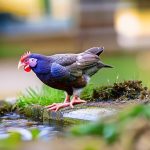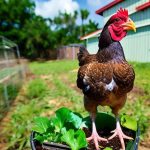Muscovy ducks and chickens are commonly domesticated poultry species often raised together in agricultural settings. Muscovy ducks, originally from Central and South America, are characterized by their large size, distinctive red facial caruncles, and quiet demeanor. They are adept foragers and can help control insect populations.
Chickens, widely domesticated globally, come in numerous breeds with varying traits and egg production capabilities. They are valued for their eggs, meat, and ability to control pests. Both species are relatively low-maintenance and can cohabitate in shared enclosures.
However, successful cohabitation requires careful consideration of several factors. These include appropriate housing and space allocation, proper nutrition, and management of behavioral interactions between the species. Understanding and addressing the specific needs of both Muscovy ducks and chickens is crucial for maintaining their health and welfare in a shared environment.
Table of Contents
- 1 Considerations for Keeping Muscovy Ducks with Chickens
- 2 Housing and Space Requirements for Muscovy Ducks and Chickens
- 3 Feeding and Nutrition for Muscovy Ducks and Chickens
- 4 Health and Disease Considerations for Muscovy Ducks and Chickens
- 5 Behavioral Interactions between Muscovy Ducks and Chickens
- 6 Tips for Successfully Keeping Muscovy Ducks with Chickens
- 7 FAQs
Key Takeaways
- Muscovy ducks and chickens can be kept together, but there are important considerations to keep in mind.
- Providing adequate housing and space is crucial for the well-being of both Muscovy ducks and chickens.
- A balanced diet is essential for the health and productivity of Muscovy ducks and chickens.
- Regular health checks and disease prevention measures are important for keeping Muscovy ducks and chickens healthy.
- Understanding the behavioral interactions between Muscovy ducks and chickens can help in managing their cohabitation successfully.
Considerations for Keeping Muscovy Ducks with Chickens
When considering keeping Muscovy ducks with chickens, it’s essential to understand the differences in their behavior, dietary needs, and space requirements.
Behavioral Differences
Muscovy ducks are generally more independent and less social than chickens. They prefer to forage for their food and may not compete well with chickens at feeding time.
Housing and Space Requirements
Muscovy ducks have different housing requirements than chickens, as they prefer to roost off the ground and need access to water for bathing and mating behaviors. Chickens, on the other hand, are more social animals that thrive in flocks. They have a strict pecking order and may bully or peck at ducks, especially if they are introduced as adults.
Preventing Competition and Aggression
It’s crucial to provide enough space and resources to prevent competition and aggression between the two species. Additionally, chickens have different dietary needs than ducks and may require supplemental calcium for egg production. Overall, keeping Muscovy ducks with chickens can be successful with proper planning and management.
Key to a Harmonious Coexistence
Understanding the unique needs of each species and providing adequate space, resources, and social dynamics will help ensure a harmonious living environment for both ducks and chickens.
Housing and Space Requirements for Muscovy Ducks and Chickens

When housing Muscovy ducks with chickens, it’s important to provide adequate space and shelter for both species. Muscovy ducks prefer to roost off the ground, so providing elevated perches or nesting boxes will accommodate their natural behaviors. Additionally, ducks require access to water for bathing and mating activities, so a shallow pond or water source should be provided within their living space.
Chickens, on the other hand, require nesting boxes for egg-laying and roosting bars for sleeping at night. They also need access to a secure outdoor run for foraging and exercise. When housing ducks and chickens together, it’s important to provide enough space to prevent overcrowding and competition for resources.
A general rule of thumb is to provide at least 4 square feet of indoor space per duck and 2 square feet per chicken, with ample outdoor space for foraging and exercise. Separate feeding and watering stations should also be provided to prevent competition between ducks and chickens. Additionally, providing hiding spots or barriers within the living space can help reduce aggression and bullying between the two species.
By understanding the unique housing and space requirements of Muscovy ducks and chickens, you can create a comfortable and harmonious living environment for both species.
Feeding and Nutrition for Muscovy Ducks and Chickens
Feeding and nutrition are important considerations when keeping Muscovy ducks with chickens. While both species are omnivores and can eat a similar diet, there are some differences in their nutritional needs. Muscovy ducks are excellent foragers and enjoy eating insects, grass, and aquatic plants.
They also require a higher protein diet than chickens, especially during breeding season or molting. Chickens, on the other hand, require a diet high in calcium for egg production. Providing layer feed or supplemental calcium sources such as oyster shells is essential for maintaining healthy eggshells.
Additionally, chickens may require grit to aid in digestion, especially if they do not have access to outdoor foraging opportunities. When feeding Muscovy ducks and chickens together, it’s important to provide a balanced diet that meets the nutritional needs of both species. This may include a commercial poultry feed supplemented with fresh fruits, vegetables, and protein sources such as mealworms or fish.
Providing separate feeding stations can help prevent competition between ducks and chickens and ensure that each species receives adequate nutrition.
Health and Disease Considerations for Muscovy Ducks and Chickens
Maintaining the health of Muscovy ducks and chickens when kept together requires regular monitoring and preventative care. Both species are susceptible to common poultry diseases such as respiratory infections, parasites, and nutritional deficiencies. It’s important to provide a clean living environment with access to fresh water, proper nutrition, and regular veterinary care to prevent illness.
Muscovy ducks are generally hardy birds but can be susceptible to respiratory infections if housed in damp or poorly ventilated conditions. Additionally, ducks may be prone to foot infections if they do not have access to dry ground or proper roosting areas. Regularly inspecting their feet and providing clean bedding can help prevent these issues.
Chickens are prone to a variety of health issues including mites, lice, coccidiosis, and respiratory infections. Regularly inspecting their feathers and skin for signs of parasites, providing clean bedding, and practicing good biosecurity measures can help prevent disease outbreaks. When keeping Muscovy ducks with chickens, it’s important to quarantine new birds before introducing them to the existing flock to prevent the spread of disease.
Additionally, providing separate dust bathing areas for ducks and chickens can help prevent the spread of parasites between the two species. By understanding the common health issues that affect Muscovy ducks and chickens and implementing preventative care measures, you can help ensure the overall health and well-being of both species.
Behavioral Interactions between Muscovy Ducks and Chickens

Ducks are generally more independent and less social than chickens. They prefer to forage for their food and may not compete well with chickens at feeding time.
Additionally, ducks have different mating behaviors than chickens, which may require separate nesting areas or hiding spots within the living space. Chickens are more social animals that thrive in flocks with a strict pecking order. They may bully or peck at ducks, especially if they are introduced as adults.
Creating a Harmonious Environment
Providing enough space, resources, and hiding spots within the living space can help reduce aggression between ducks and chickens. When introducing new birds to an existing flock of Muscovy ducks or chickens, it’s important to monitor their interactions closely to prevent aggression or bullying. Providing multiple feeding stations, nesting areas, and roosting spots can help reduce competition between the two species. Additionally, providing environmental enrichment such as logs or branches for perching can help create a more natural living environment for both ducks and chickens. Overall, understanding the behavioral differences between Muscovy ducks and chickens and providing adequate space and resources can help create a harmonious living environment for both species.
Tips for Successfully Keeping Muscovy Ducks with Chickens
Keeping Muscovy ducks with chickens can be a rewarding experience when done thoughtfully and responsibly. By understanding the unique needs of both species in terms of housing, feeding, health care, and behavioral interactions, you can create a harmonious living environment that promotes the health and well-being of both ducks and chickens. Some tips for successfully keeping Muscovy ducks with chickens include providing adequate space and shelter that meets the specific needs of each species.
This may include elevated roosting areas for ducks, nesting boxes for chickens, access to water for bathing, and secure outdoor runs for exercise. Feeding both species a balanced diet that meets their nutritional needs is essential for maintaining their health. Providing separate feeding stations can help prevent competition between ducks and chickens at mealtime.
Regular monitoring for signs of illness or disease is important when keeping Muscovy ducks with chickens. Providing a clean living environment with access to fresh water, proper nutrition, and regular veterinary care can help prevent illness outbreaks. Understanding the behavioral differences between Muscovy ducks and chickens is essential for creating a harmonious living environment.
Providing enough space, resources, hiding spots, and environmental enrichment can help reduce aggression between the two species. In conclusion, keeping Muscovy ducks with chickens requires careful consideration of their unique needs in terms of housing, feeding, health care, and behavioral interactions. With proper planning and management, you can create a comfortable living environment that promotes the health and well-being of both species.
If you’re considering keeping muscovy ducks with chickens, you may also be interested in learning about the best location for your chicken coop. Poultry Wizard offers a helpful article on where to put your chicken coop to ensure the safety and well-being of your poultry. Proper coop placement is essential when introducing different types of poultry to live together.
FAQs
Can Muscovy ducks be kept with chickens?
Yes, Muscovy ducks can be kept with chickens as they are generally peaceful and can coexist with other poultry.
Do Muscovy ducks and chickens get along?
Muscovy ducks and chickens can get along well if they are introduced to each other at a young age and have enough space to roam and forage.
Are there any concerns about keeping Muscovy ducks with chickens?
One concern is that Muscovy ducks may be larger and more dominant than chickens, so it’s important to provide enough space and resources for all the birds to prevent any aggression.
What should be considered when keeping Muscovy ducks with chickens?
When keeping Muscovy ducks with chickens, it’s important to provide adequate shelter, nesting areas, and access to water for the ducks, as well as ensuring that all the birds have access to appropriate feed.
Muscovy ducks and chickens can share the same coop as long as it is spacious enough to accommodate both species and has separate nesting areas for each type of bird. It’s also important to keep the coop clean and well-ventilated to prevent any health issues.

Meet Walter, the feathered-friend fanatic of Florida! Nestled in the sunshine state, Walter struts through life with his feathered companions, clucking his way to happiness. With a coop that’s fancier than a five-star hotel, he’s the Don Juan of the chicken world. When he’s not teaching his hens to do the cha-cha, you’ll find him in a heated debate with his prized rooster, Sir Clucks-a-Lot. Walter’s poultry passion is no yolk; he’s the sunny-side-up guy you never knew you needed in your flock of friends!


Meet Walter, the feathered-friend fanatic of Florida! Nestled in the sunshine state, Walter struts through life with his feathered companions, clucking his way to happiness. With a coop that’s fancier than a five-star hotel, he’s the Don Juan of the chicken world. When he’s not teaching his hens to do the cha-cha, you’ll find him in a heated debate with his prized rooster, Sir Clucks-a-Lot. Walter’s poultry passion is no yolk; he’s the sunny-side-up guy you never knew you needed in your flock of friends!







